This post may contain affiliate sales links. Please read my disclosure policy.
Today’s tutorial is all about how to frost a smooth cake. Getting that nice, smooth finish when icing a cake can take some practice, but I have been asked so many times about how I get my icing so smooth, I’ve finally put together some instructions that I hope will be helpful. Just remember you have to be patient. My first cake did not look like my current cakes. It took practice – and the right tools.
Want to frost cupcakes? See my post on how to beautifully frost your cupcakes!
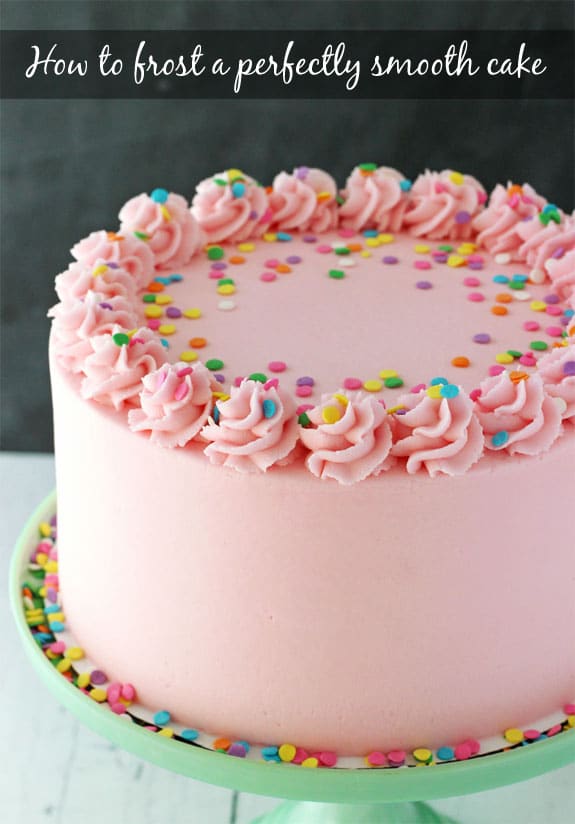
Watch How To Do It
So to start, let’s talk about the tools you’ll need:
Icing tips (Wilton #789 for icing the sides and Ateco 844 for piping the border)
Icing bags
Turntable (I use Wilton Trim-N-Turn Ultra Cake Decorating Turntable)
Icing smoother (I 100% recommend Ateco Decorating Comb over any other)
9 inch offset spatula (I use Wilton Angled Spatula)
Fondant smoother (I use Wilton Easy Glide Fondant Smoother)
Viva paper towels (Viva brand specifically)
Let’s talk about that icing smoother for a second. I linked to it above, but it’s an Ateco smoother that costs less than $5. It is the best money I have ever spent on a tool. I used to use another one, but it was big and clunky and I had no idea how much it hindered my ability to get a nice, smooth cake until I tried this one. It’s lightweight, small and easy to use.
In addition to those tools, you’ll obviously need a cake and some icing. I used regular American Buttercream (American Buttercream recipe here). For my cakes that are about this size, I go through about 2 1/2 recipes worth.
For this tutorial, I started with a cake that was already crumb coated and had a layer of icing on the top of the cake. It’s important to already have the top layer on the cake and get it as smooth as you can with your offset spatula. It’ll get further smoothed later, but it’s best to have it smooth now too.
The crumb coat isn’t entirely necessary for every cake. Typically chocolate cakes are more likely to need them, since they tend to have more crumbs. But because of the way I add my icing, it’s not always necessary. I use an icing tip and bag, which reduces crumbs mixing into the icing.
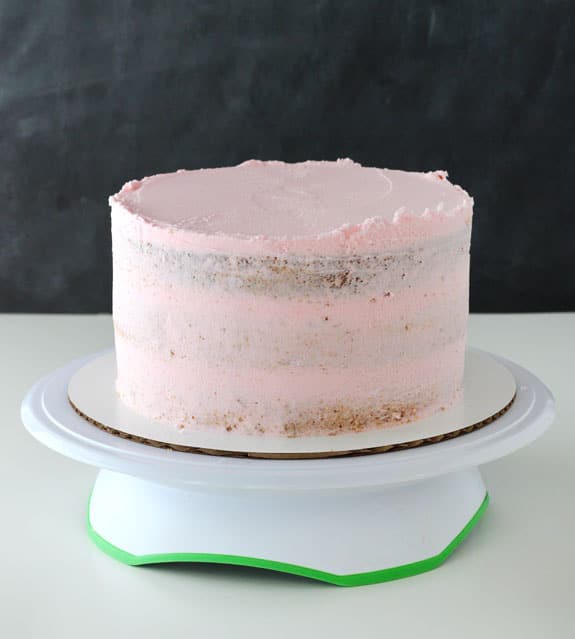
How to Frost a Cake
So to get started from here, you’ll want your icing bag fitted with the Wilton #789 icing tip and filled with icing. Starting from the bottom of the cake, pipe icing around the edge, trying to keep even pressure on the bag so that the layer of icing is even.
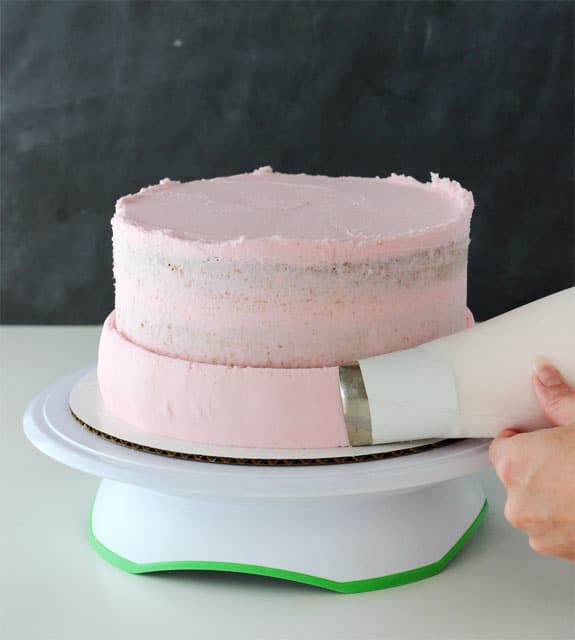
You’ll have multiple layers of piped icing, depending on the height of your cake. The top layer needs to stick above the top edge of the cake. This will be important later for smoothing the top edges/corners of the cake.
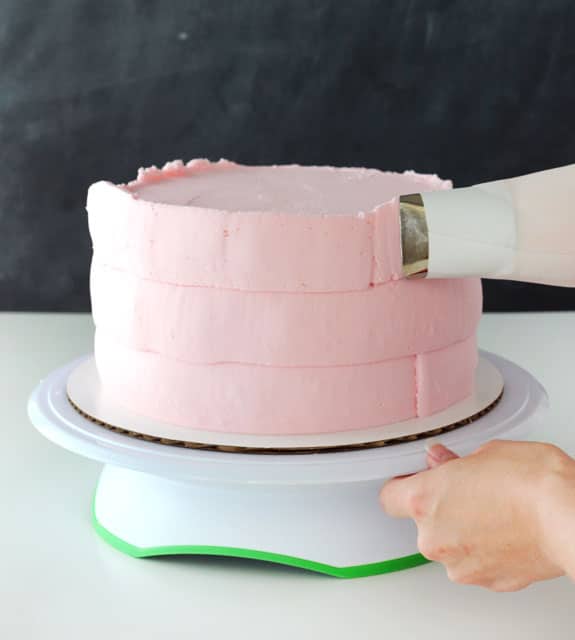
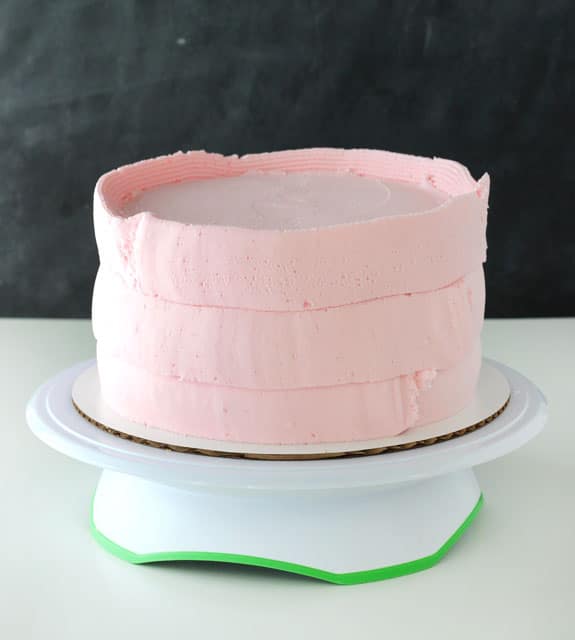
When you are done applying the icing to the sides of the cake, it’s time to smooth it. This is where the icing smoother comes in. Place it against the side of the cake. You want to hold it straight up and down, as straight as possible. Hold your icing smoother in the same place and use your other hand to turn the turntable. Continue to turn the turntable, scraping the icing off of the smoother occasionally so that there isn’t too much buildup. I clean off my smoother regularly and when I scrape the excess icing off of it, I usually also wipe it with a paper towel, so that there isn’t anything left on there that will mess up the icing once I place it back on the side of the cake.
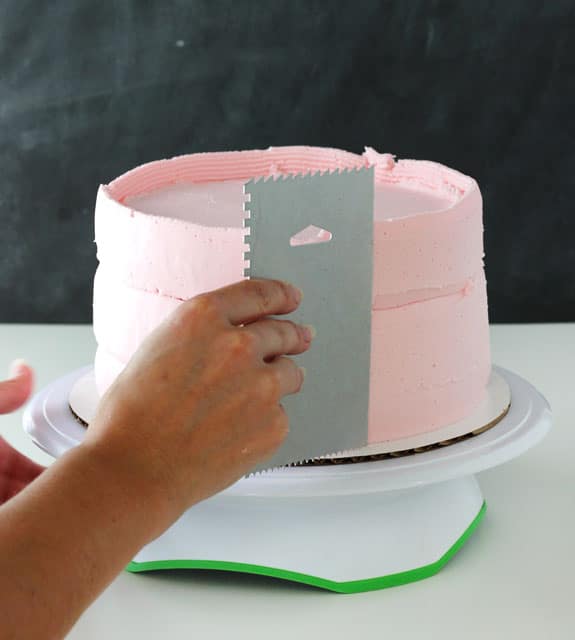
Here is an image showing the angle at which I hold the smoother. I really believe the angle makes a big difference in the way the icing smooths. Do not hold it at 90 degrees. The tighter the angle (like shown), the better the excess icing pulls around the cake and fills in gaps.
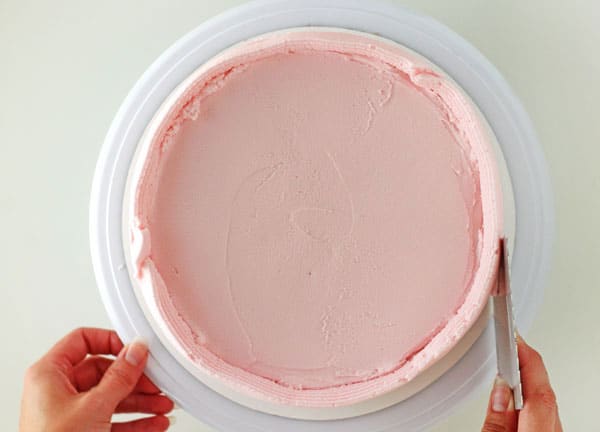
After doing a few turns of the turntable, you’ll notice some gaps that are deeper and should probably be filled in. I usually notice it at the “seems” where the three layers of icing were piped on. At this point, use your offset spatula to add some icing to the gaps. You’ll want to have a little excess icing, rather than too little.
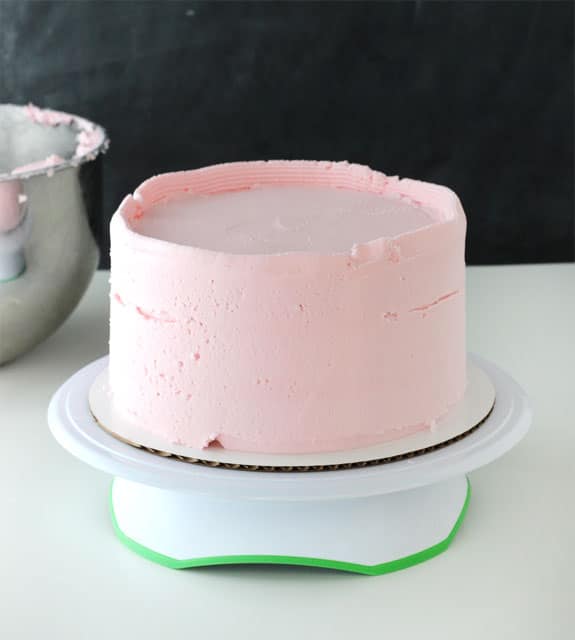
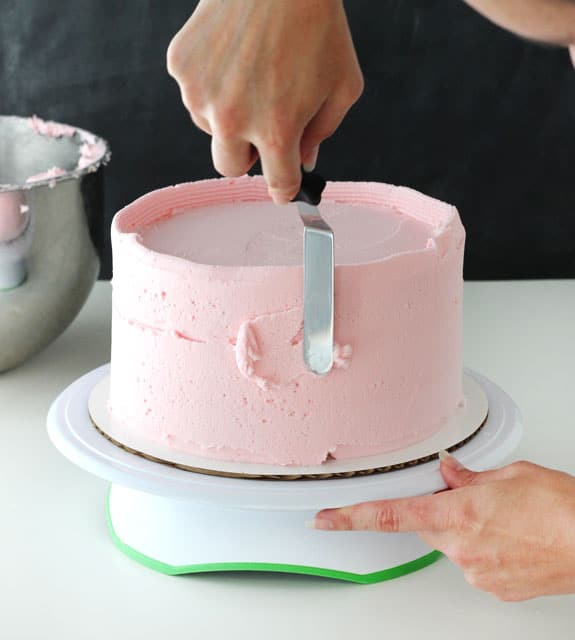
Begin smoothing the sides again, pulling the excess icing around the cake to fill in gaps, then wiping off the icing smoother as needed.
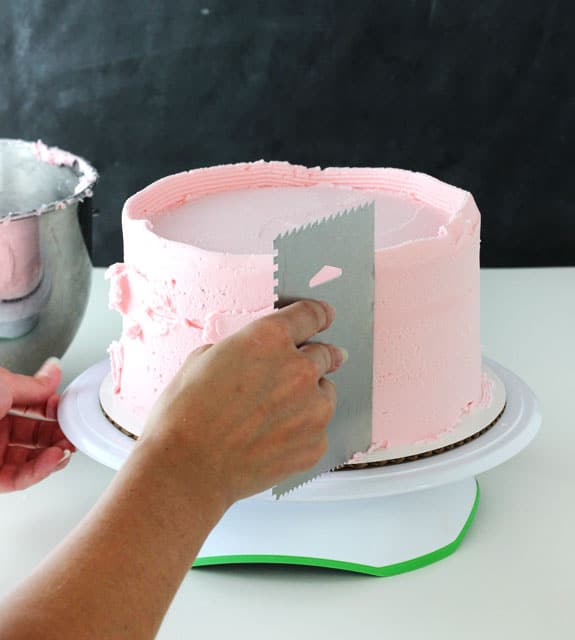
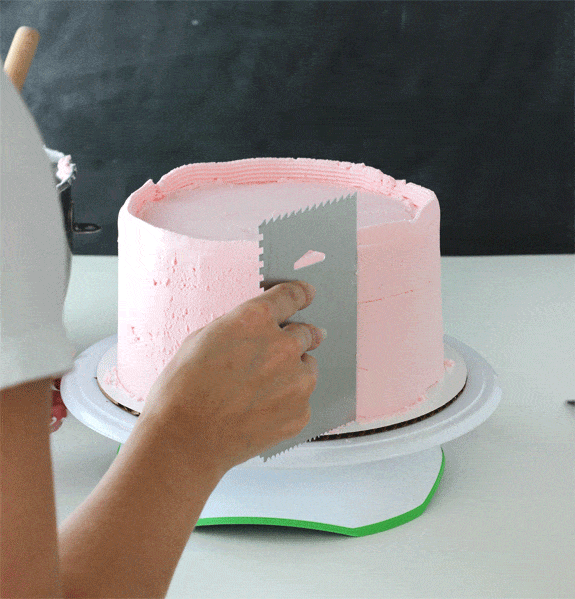
Continue working around the outside of the cake, pulling the icing, then scraping it off of the icing smoother. You can fill in more gaps if needed, just keep working the sides until you are happy with it.
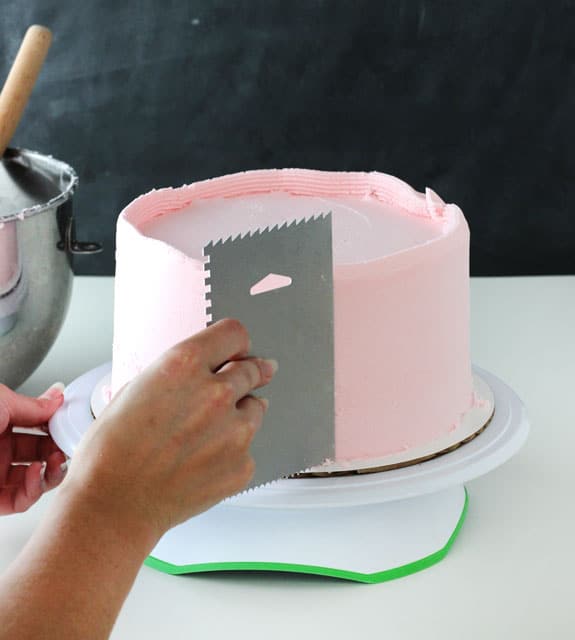
You should end up with a cake that looks like this. The sides are mostly smooth and the excess icing from the top is still sticking up above the cake. In some places you may have tiny little holes from the air in the icing. The angle that you hold the icing smoother can make a difference in how many of those you end up with. Again, tighter angle is better. Also, some of those will fill in as we smooth the sides again later with a paper towel.
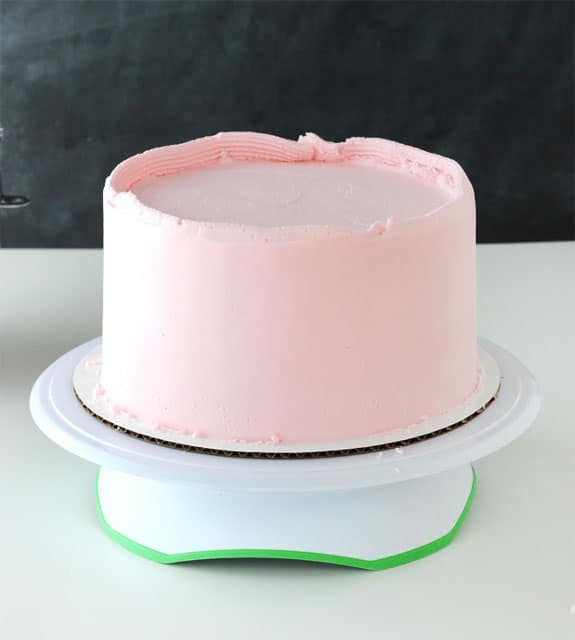
Next is always the scariest part! The top edges/corners. It was even harder to do these while taking photos. 🙂 The whole icing process took longer than normal, so my icing started to crust a bit and so it’s a little drier in the photos than yours should be at this point. You want to work as quickly as you can. If the icing starts to crust, it’s harder to work with.
To do the edges, you can use the icing smoother or the offset spatula. I use either, depending on my mood, though often I do feel like the offset spatula gives me more control. Pull the icing in towards the middle of the cake, making the corner level with the top of the cake. The spatula should be at about a 45 degree angle. The excess icing should help fill in any uneven-ness on those top corners as you pull it in.
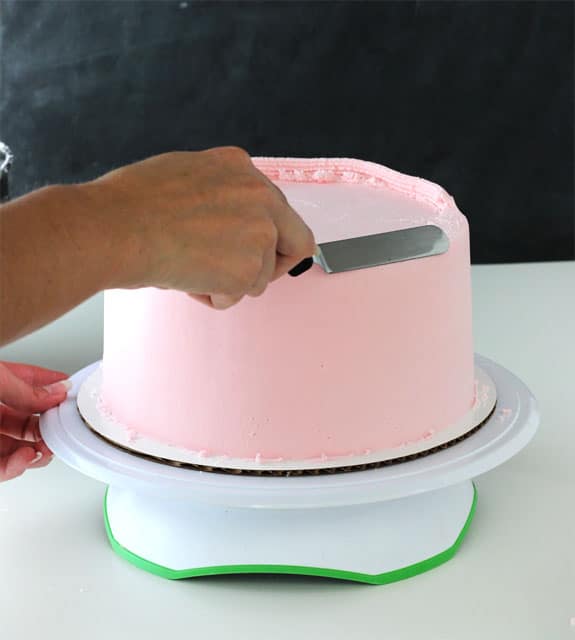
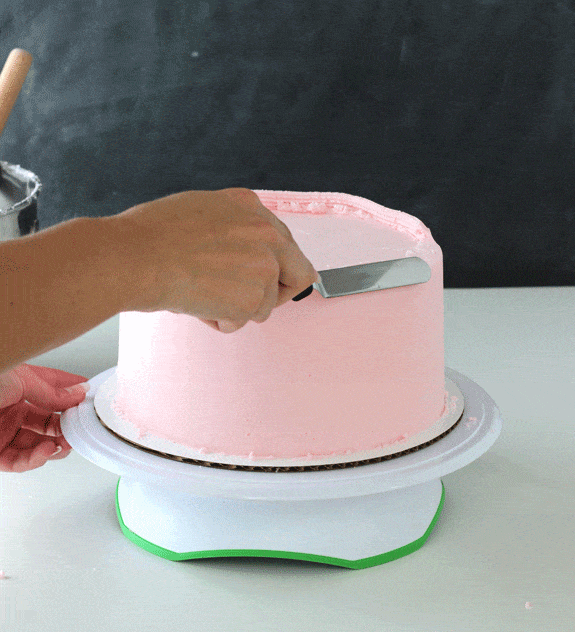
Go all the way around the cake, until it looks like the one below. Again, my icing is a bit drier than yours should be. Hopefully, your cake top is a bit smoother.
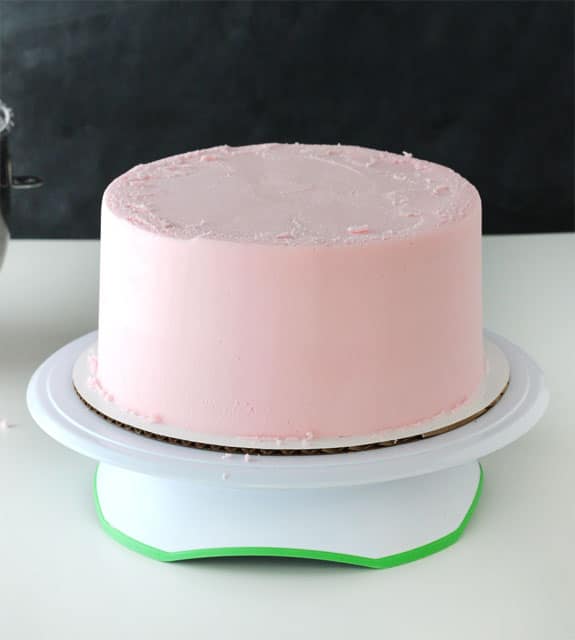
Use your offset spatula to continue to work the icing on the top of the cake and smooth the top edges. Do not mess with the sides or side part of the corners yet. Just try to get the top as smooth as you can, the sides should already be smooth.
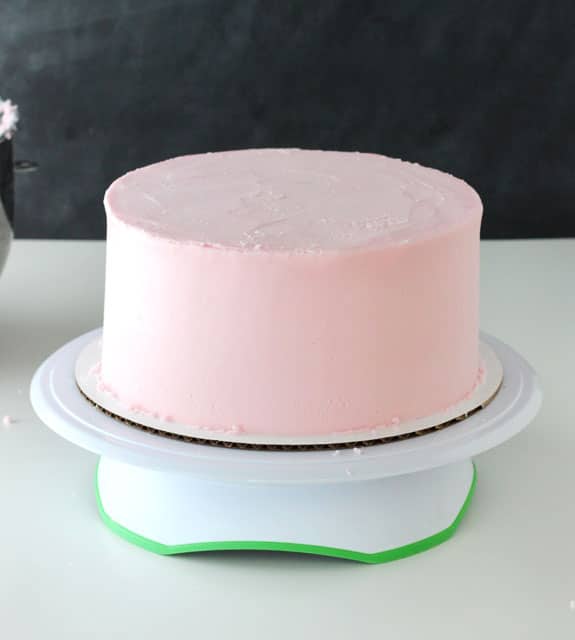
Next, we use the paper towel to finish smoothing any imperfections that are left from the offset spatula. Like I said above, I ONLY use Viva paper towels for this. They are the only paper towel I know of that doesn’t have raised patterns on it. You’ll notice that one side is smoother than the other – that’s the side you want against the cake.
I usually start with the top of the cake, since it tends to be rougher and need more work. Along with your paper towel, you’ll need the fondant smoother. Place the paper towel on the cake, smoothest side down, and rub in small circular motions with the fondant smoother to smooth out the icing. Press firmly and evenly, but not hard.
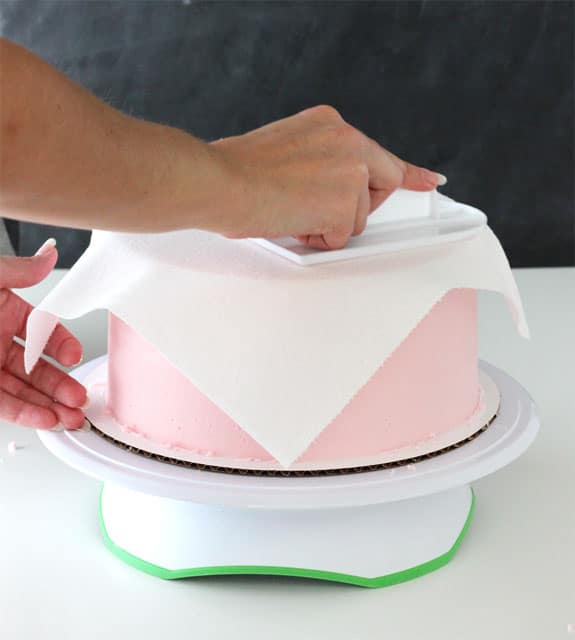
Do the same with the sides of the cake, evening out any bumps or air holes.
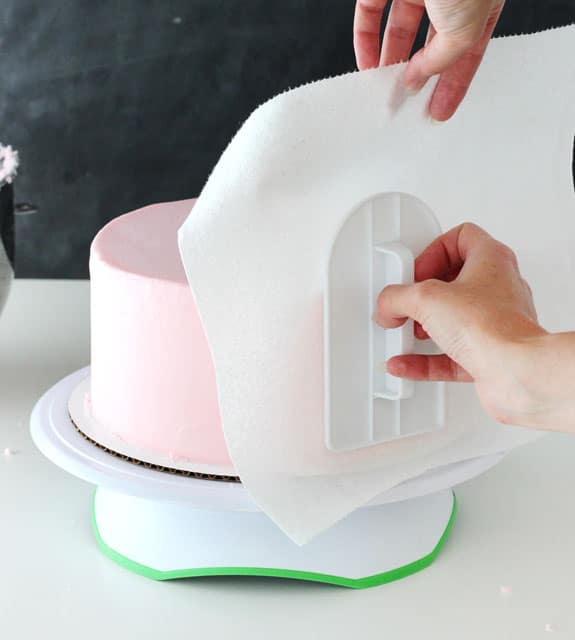
To help make sharper corners, place the paper towel on the top of cake, letting it hang over the edge and down the side. Placing your fingers against the side of the cake to keep the icing in place, use the fondant smoother to gently push the icing out towards to edge to help make that corner sharp. Do that anywhere you think the edges could use it.
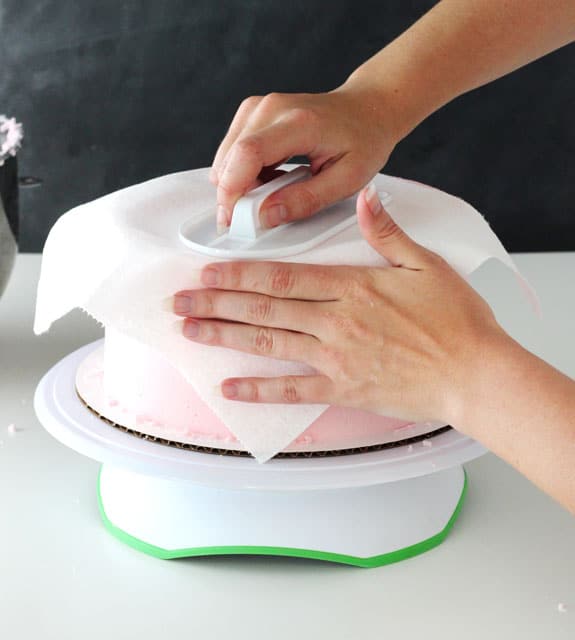
Keep working that paper towel and fondant smoother until you are happy with your cake.
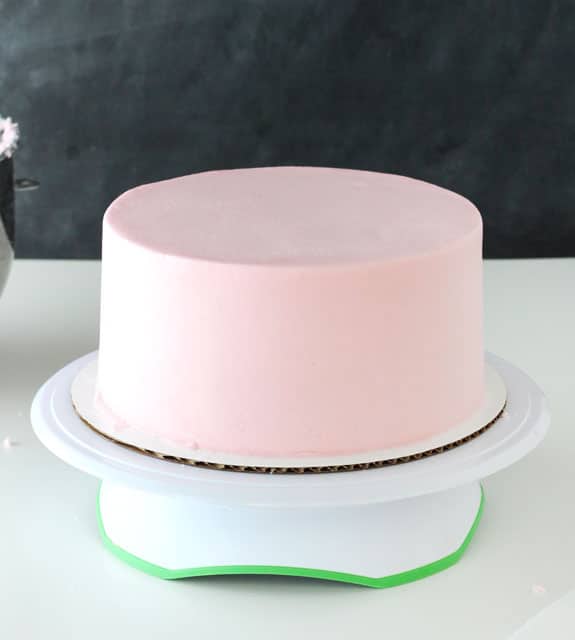
Next, I like to take my offset spatula and remove excess icing at the bottom of the cake and give it a clean edge. The spatula is placed at an angle so that nothing is actually touching the side of the cake, but just the bottom of the spatula side is grabbing the excess icing. Then pull the excess towards you and away from the cake.
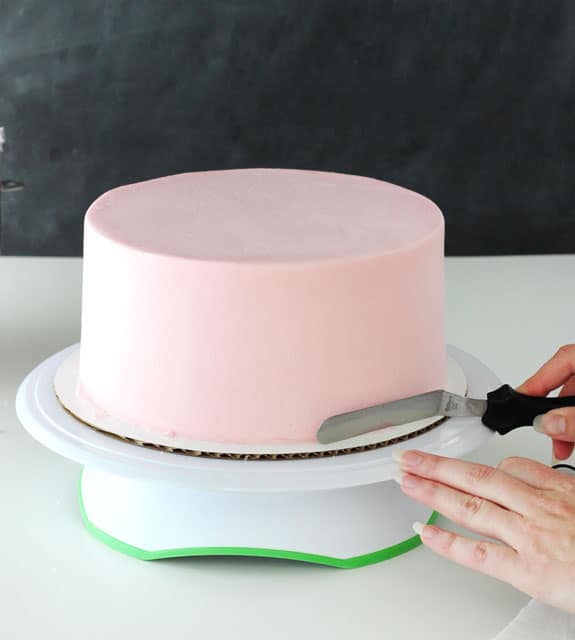
Use your other icing tip to pipe on your border. I used Ateco tip 844, but you could also use Wilton 1M, which is similar, or any other tip you prefer.
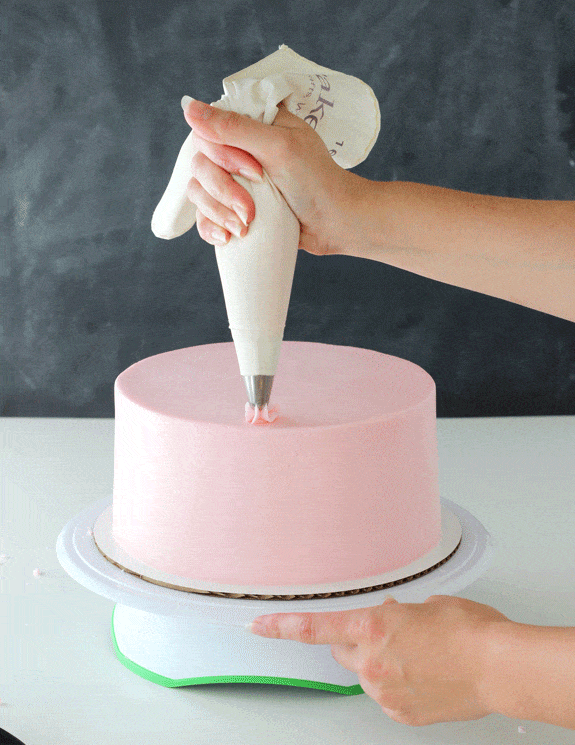
Sprinkle with some spraaaankles (I used Wilton Spring Confetti Sprinkles!
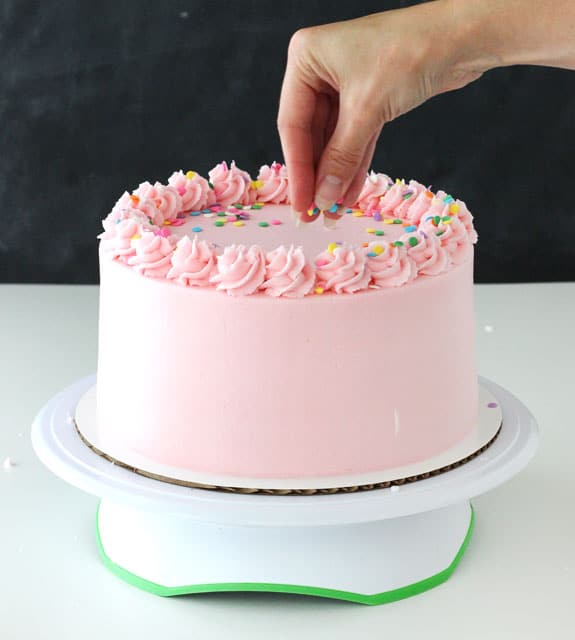
And you’re done! Put your cake on your favorite cake stand, add a few more sprinkles and dig in!! It’s time to eat all that hard work. 😉
*Update* For some help with getting the right frosting consistency, check out my new post, How to Get the Right Frosting Consistency, on how I like to do it.
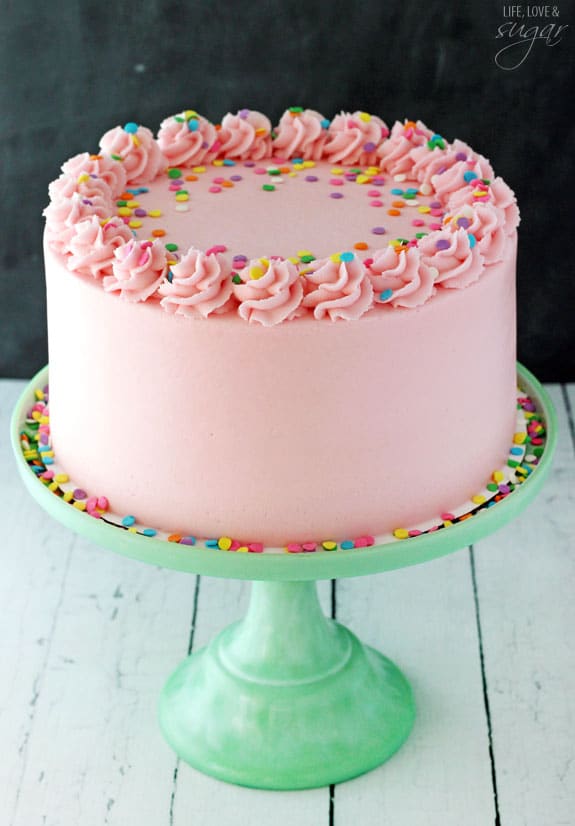
This page includes affiliate links.

Learn how to decorate Sugar Cookies with Royal Icing
Practice your smoothing technique on some of these delicious cakes:
Moist and Fluffy Vanilla Cake
(the recipe for the cake in the tutorial above!)

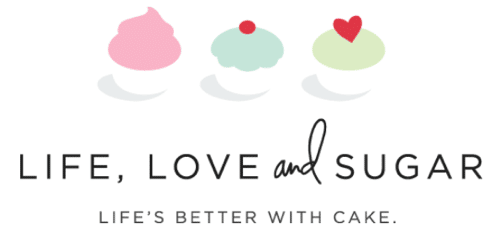
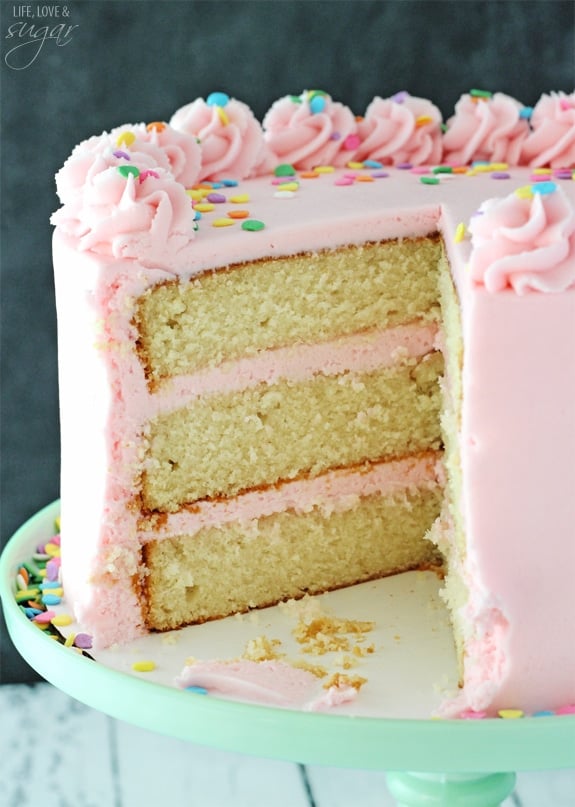
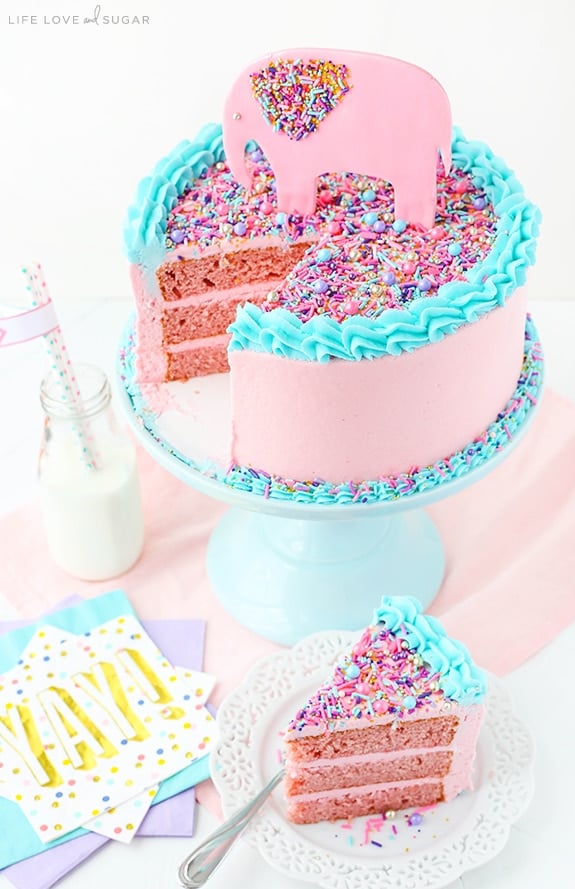
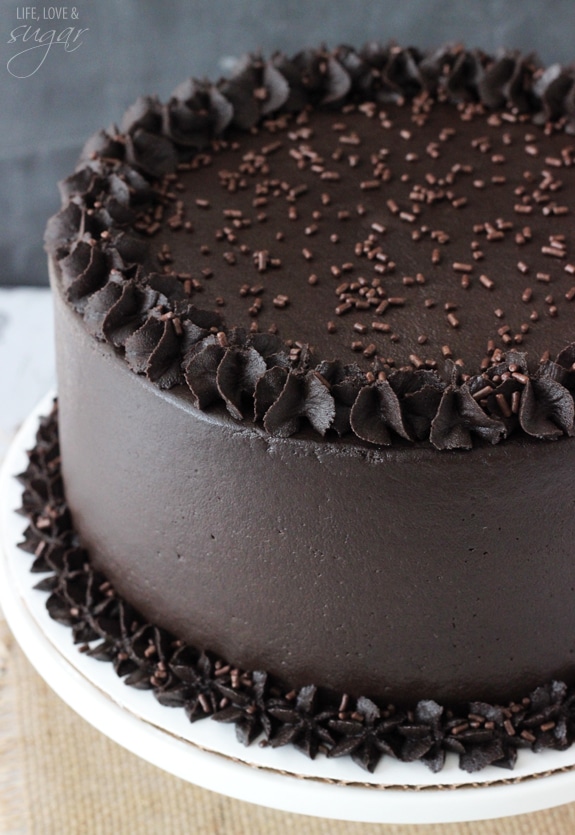
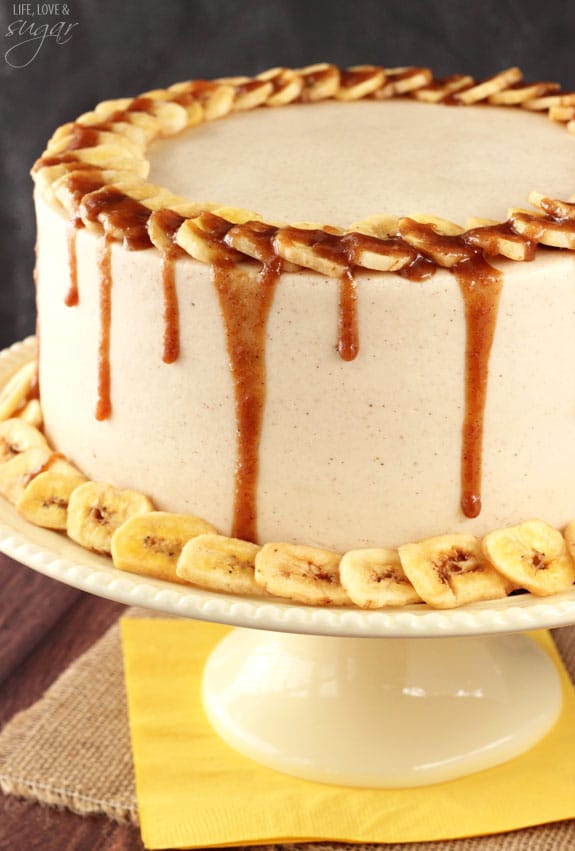
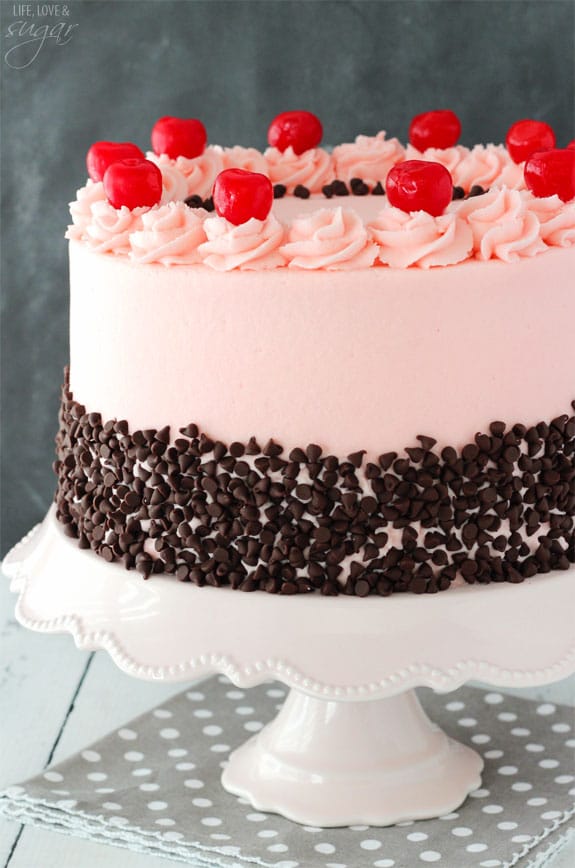
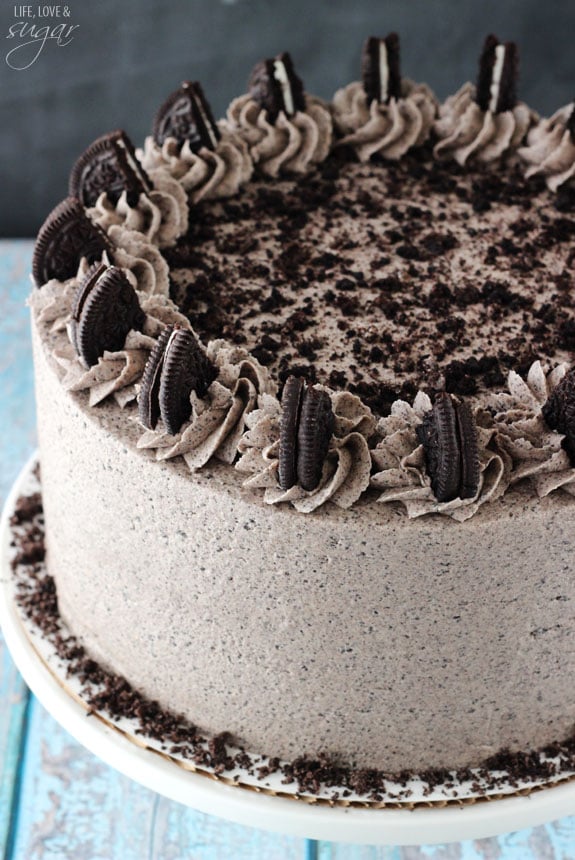
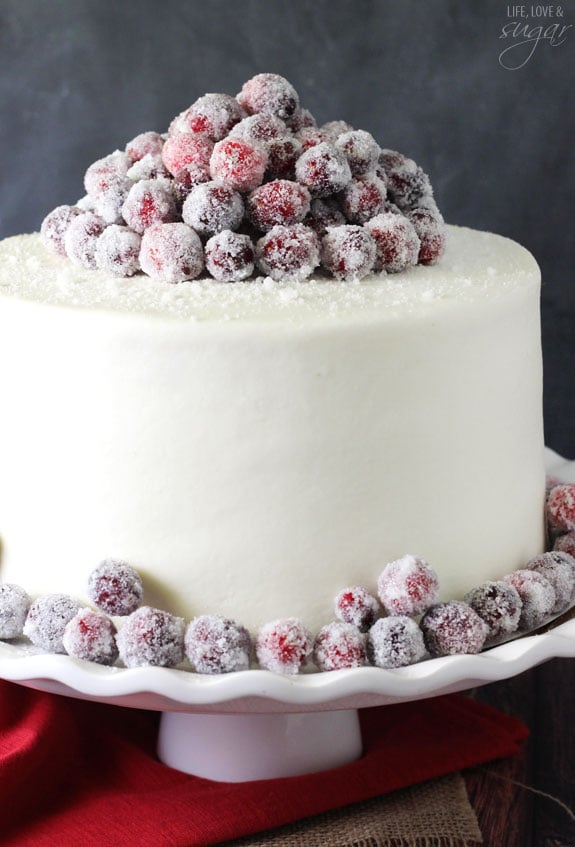
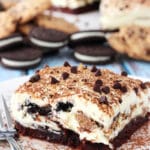
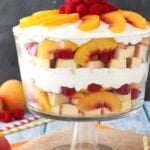


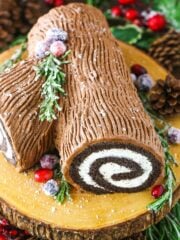


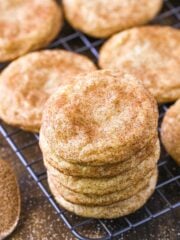

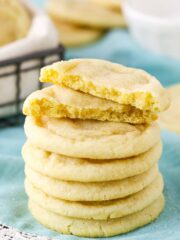
Very nice tips. I admire your very clean, smooth frosting on cakes. However, when i check the materials used, the icing tip in Amazon looks different from the one you use in the picture? Kindly check again. Thank you :))
Hi Alma! I checked the links and they appear to correct.
I know this is 2 yrs later but if you’re still looking it came up wrong for me as well… search for Wilton 789 and the right one will come up on Amazon
Love this post…you do always have the smoothest looking cakes! I use paper towels to smooth out my cakes too, but I never though to use a fondant smoother over the paper towels. I’m definitely getting one of those before I do another cake.
I just bought one of everything Lindsay! This is AWESOME! Now I want to bake a cake 🙂 Pinned!
Awesome Trish! 🙂 Glad it was helpful!
WOW! Lindsay, this is fantastic! I just learnt so much – I didn’t know you should put the icing on the top first or that you could use a tip like that to pipe on the icing OR that you could smooth it over with a fondant smoother and a paper towel. I will be referring to this tutorial often! Thank you so much!
Awesome! I’m glad you found it so helpful! Thanks Jessica!
Very nice! What a perfect cake. Great tutorial! The tools are so important in cake decorating! Now I need a GIF file tutorial from you. Love the animation. p.s. Your nails look so pretty! 🙂
Haha, thanks Lise! 🙂
Beautiful post, Lindsay!! Your gifs are great.
My goodness, this is one of the best tutorials I’ve ever seen. The careful explanations and many photos are so much more helpful than just do this, then it should look like this, then you’re done. I like that you give the reasons WHY you do things a certain way as it is clear you’ve had a ton of experience and have worked out the best methods through practice. Stunning cake. Bravo.
Thanks Erin! I’m so glad it’s helpful 🙂
Can you do 3 layers of cake to one tier and not worry about it sagging I’ve wanted to do it but was afraid the a 3 layer tier would not hold up. Can you do this for any size. Even a 16 rd
It should be fine with 3 layers of cake. I have many like that on the blog. The method should work for most any size cake, it’s just a little trickier to execute at a large size.
Thank you for this tutorial! I have had no idea how to frost a cake properly till know!
Oh man, I love this! I always have a hard time getting the smooth cake look. I really like your use of gifs, very helpful! Piping the frosting around the outside of the cake and smoothing it out seems so much easier than slapping some frosting on there. I’m going to have to try this! 🙂
Thank you SO much for this tutorial. Your descriptions and pictures make everything easier to understand. I had heard of the Viva papertowel thing before but wasn’t sure (until now) how exactly to make this technique work.
I’m so glad it’s helpful! Thanks Jenifer!
I’m just surprised how the paper towel doesn’t stick to the frosting and manages to come up clean!
Love your very helpful tutorial. Are the viva paper towels select a size or does it matter?
Thank you so much,
Kim
I’ve never used the select a size one, so I’m not sure what those are like. As long as they are smooth, I’d guess they’d be fine.
What a great tutorial!
Thank you so much. Excellent tutorial.
This is a great tutorial and I now have Ateco icing smoothers in my Amazon shopping cart! Thanks for sharing!
Wonderful! I’m glad it was helpful! Thanks Martha!
This is awesome, I love that you use a lot of photos to make it easy doing at home, I like tutorial gif photos that show how to put cream on the top of the cake
Love this!!! The gifs are awesome. I will have to get a bench scraper, since I have seen so many cake experts recommend it! 🙂
I am completely in love with this tutorial, Lindsay! I’ve taken a lot of decorating classes, but I’m not anywhere near as good as you. Your pics and instructions are so clear and helpful!